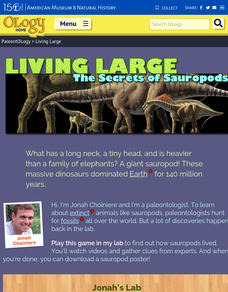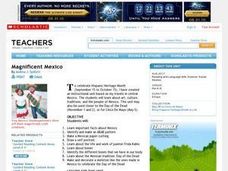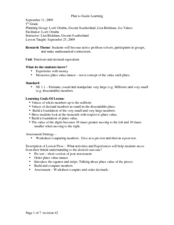Curated OER
The Human Skeletal System: Inside and Out
Students study bone size, structure and shape. They use various geometrical shapes to make a skeleton and produce a poster depicting the skeletal system and its functions. They arrange the pictures into the five sections, glue on...
Curated OER
"Fast As Fast Can Be..."
Students practice strategies on becoming better fluent readers by repeated readings and by becoming phonemically aware of reading whole sentences with expression and emotion. They read the books, "The Skeleton on the Bus," "Don't Worry,"...
Curated OER
Make No Bones About It
In this math worksheet, students solve 25 multiplication problems with solutions greater than 4,000. Students use their solutions to solve a riddle about skeletons.
Curated OER
Moving and Growing
Learners know that humans and some other animals have bony skeletons inside their body. They know that other animals have skeletons on the outside of their bodies. They explain the role of both kinds of skeletons.
Cool Craniums
Rise to the head of the class. Using mammal skulls, groups of pupils identify aspects of them. The teams make predictions on the classification of mammal the skull belongs to based upon the observations.
Purdue University
Model of Prosthetic Leg
Give the class a leg up in their understanding of engineering. A STEM activity has learners design a prosthetic leg that can kick a ball. They build a prototype of the prosthetic, keeping track of the design costs associated with their...
American Museum of Natural History
Living Large
Get to know all about sauropods from a paleontologist, Jonah. Following an introductory video, scholars choose from five fossils to learn more about. Each fossil begins with a video, provides information from several different...
Curated OER
Bones and Muscles
Third graders are introduced to bones as the body's means of support and protection. They research bone facts and conduct an experiment with chicken bones. They identify and observe involuntary muscles at work.
Curated OER
Studying Fossils
Students compare and contrast key skeletal differences between chimpanzees and humans: brain size, teeth, hand and thumb, trunk, pelvis, lower limb, foot and big toe. They then sort and group a set of mixed "fossil bones" of chimpanzee...
Curated OER
Skeletal System
Seventh graders identify and label twenty-five bones of the skeletal system. In small groups they glue various types of dried pasta to a large human body outline. They attach the pasta to the outline and label the pasta bones.
Curated OER
Study of Fossils
Fifth graders dig for fossils. In this fossil lesson, 5th graders read about the oldest found fossils and discuss the process of fossilization. They dig for their own fossils in a fossil box made of several dirt layers.
Curated OER
Dinosaur Jokes
For this science worksheet, students use the key code found on the right to locate the answers to each of the bad dinosaur jokes. Then they write out the answer to the joke.
Curated OER
Going Places
In this going places worksheet, students read the passages provided and answer the given questions. Students answer questions as it relates to the skeletal system, puberty, and microorganisms.
Curated OER
Bodies in Motion
Young scholars work in teams and train in the methods of anthropometry, the measurement of the human body. These activities require calipers or measuring tapes, meter sticks, skin fold calipers, and human skeleton.
Curated OER
Magnificent Mexico
Students complete a variety of activities in a unit about the art, culture, and traditions of Mexico. They read books about the Day of the Dead, create a skeleton puppet, and create a traditional Mexican tissue paper cutting. Students...
Curated OER
Skeletal Tissue
In this skeletal system activity, students match 10 terms with their meanings, answer 20 multiple choice questions, fill in the blanks for 24 questions and answer 6 questions. Topics include structures and functions of the skeleton, bone...
Curated OER
Taking Apart Owl Pellets
Students dissect an owl pellet. In this rodent and bone structure instructional activity, students work in groups to take apart an owl pellet. Students separate all the tiny bones from the fur and use the bones to reconstruct the rodent...
Curated OER
What Do We Learn From Fossils?
Students investigate what a fossil is and how it came to be. In this fossil lesson, students examine pictures of skeletons and identify characteristics that can and cannot be determined by a fossil. Students complete diagrams of a...
Curated OER
Dissecting Owl Pellets
Students dissect owl pellets. In this dissecting owl pellets instructional activity, students discuss birds of prey and make predictions about what they may find during the investigation. Students tease out skull and bones and try to...
Curated OER
Preschool Lesson Ideas: Human Body Lesson Plan and Five Senses Activities
Students explore their five senses. In this human biology lesson, students participate in various learning centers that include activities such as creating a Q-tip skeleton, feeling play dough, creating "goop" and listening to drum beats.
Curated OER
Fractions and Decimal Equivalents: Fifth Grade
Sometimes a skeleton is all you get. This lesson outline provides teachers with a basic lesson flow. Pupils will pre-test, order place value names, use manipulatives, and build and compare numbers. How this is to be done is not...
Curated OER
Plants
Really only five slides of information, this resource is an outline on planting field crops. From it, aspiring agriculturists are exposed to different seeding methods: drilling, row crop planting, broadcast seeding, and air seeding. This...
Curated OER
Bone Thickness
Students calculate the relative thickness of limb bones in five different species. They relate this to the strength and functions of the limbs by comparing and contrasting the values calculated from the bone measurements. They work in...
Curated OER
Superhumans and Bionics: Building Hi-Tech Exoskeletons
Students explore how the body works. Students experiment and participate in activities to compare speed to stride length. Using the data collected, students draw conclusions about the biology of dinosaurs, their speed and stride length.
Other popular searches
- Dinosaur Skeletons
- Rodent Skeletons
- Animal Skeletons
- Skeletons Using Toothpicks
- Skeletons Joints
- Human Skeletons
- Skeletons Make a Skeleton
- Poems Skeletons
- Skeletons and Teeth
- Skeletons K 3
- Dino Skeletons
- Hamsters Skeletons

























